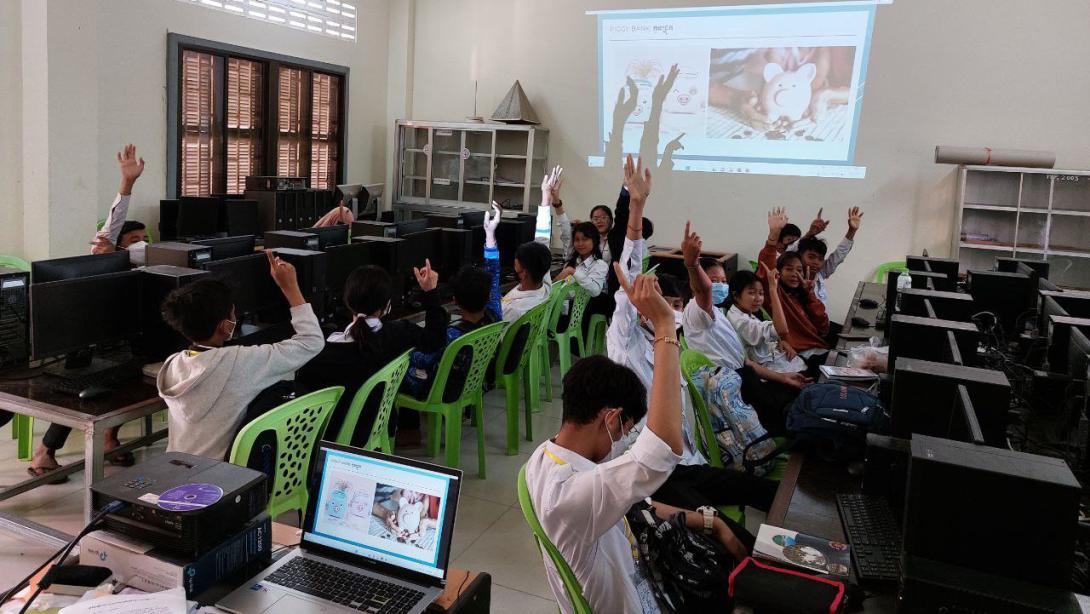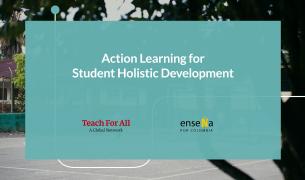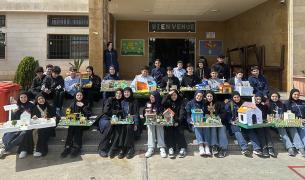Empowering students through financial literacy

One of our core priorities at Teach For All is preparing students to shape meaningful careers and thrive in a fast-changing economy. Part of realizing this vision is equipping students with financial competence and other critical life skills that they need in order to make informed decisions and access better opportunities. This is why, under our Future of Work Initiative, we are supporting our partner organizations to launch financial education programs in schools in under-resourced communities around the world. Through these efforts, we are training teachers to support young people in learning fundamental elements of the financial world, such as saving money, budgeting, investing, managing debt, evaluating risk and reward, and developing basic entrepreneurial skills. Equally important, through high-quality financial education programming, network teachers are also helping students to develop the motivation and confidence for lifelong learning and problem-solving.
These programs are already bearing fruit, as evidenced by the recent recognition from the World Economic Forum, which selected Teach For All’s Financial Education Initiative as one of its Education 4.0 Lighthouses. Across our network, we see many examples of teachers who are using creativity and innovation to empower their students with financial literacy and other skills that will help them unlock greater opportunities and achieve financial resilience.
Funding Community Improvements with Student-Led Business
Among these teachers is Elisabeth Domínguez, an Enseña por Colombia fellow who teaches fifth grade at San Pedro Apostol Educational Institution in Barranquilla. Elisabeth considers it a priority to help her students become financially knowledgeable and equipped to make smart decisions about saving and spending money. “I think it is very important that children today make the right decisions about their finances,” she notes, “from buying the school snack, to investing in a business.” Elisabeth created a lesson with the objective of getting students to identify needed improvements to their classroom, prioritize the greatest needs, and work together to earn and save money to make those improvements. After a brainstorming session—during which students discussed different needs such as adequate lighting, paint, decorations, bigger bathrooms, better ventilation to help alleviate the intense heat in the afternoons, and many others—they decided to prioritize the lighting and ventilation needs of their classroom. They wanted to raise money to contribute to the construction of a high window with vents, which would help solve both these issues. To make this a reality, the students thought of ideas like selling obleas—traditional Colombian wafers filled with arequipe (caramel sauce) and cheese—and homemade popcorn of different flavors. These ideas were not only profitable and innovative, they were also rooted in the culinary culture of their region. Through this activity, the students learned the importance of saving money, strengthened their teamwork skills, and worked together to create an entrepreneurial solution to a problem they recognized in their own learning environment.
Not far away, Alberto Marquez teaches in El Mamey, at an ethno-educational school where the majority of students and teachers belong to the indigenous community of the nearby Sierra Nevada de Santa Marta. Situated in this isolated mountain range, this rural community faces many challenges in education, access, and connectivity. As Elisabeth did for her fifth-graders, Alberto adapted the financial education curriculum from Enseña por Colombia to his tenth- and eleventh-grade students’ circumstances. The high schoolers learned how to manage money and were motivated to design a business plan that would contribute to their region. As the school is located along the tourist pathway to Ciudad Perdida—a famous archaeological site where an ancient city once stood—the students created a budget and business proposal to offer eco-tours through the Sierra Nevada de Santa Marta, which would educate travelers about their town and the cocoa farms in the surrounding area.
Building Spending and Saving Habits
Elisabeth and Alberto are just two of many teachers across the Teach For All network who have made it their mission to teach their students how to make smart financial decisions. Teachers of several network partners in countries across the globe have shared examples of how financial education instills good habits like saving, tracking personal spending, making price comparisons, determining needs versus wants, and planning ahead. Salav Oul, a Teach For Cambodia fellow, realized that her students readily applied their learning in their daily decision-making; she notes: “A few students told me that they have been saving up to buy something they want. This morning, I went stationery shopping with one of the students. I observed that she considered the ‘needs and wants’ when she wanted to buy watercolor for her painting. Finally, she decided not to buy it because she just wanted it and she wanted to save enough to buy it instead of spending her pocket money. Another boy told me that since he studied financial education, he has been saving to buy a camera because he wants to be a photographer.”
Beyond instilling basic financial skills and habits, many teachers in our network have noted that financial education can foster a strong sense of empowerment, self-confidence, and teamwork, as well as broaden students’ sense of possibility. For girls especially, financial literacy is a life-long skill that can transform their lives and the lives of their families, helping them to be better prepared for the future and to contribute meaningfully to the economic growth of their community. Network teachers have reported gains not only in students’ basic financial knowledge, but also in their levels of confidence, assertiveness, and sense of agency. For example, Enseña por Colombia staff found their 20-hour financial education curriculum increased students’ financial knowledge by about 30% on average, and among the girls surveyed they saw an increase of 3% in measures of self-perception and 6% in measures of family support. As Patrick Mugyenyi, a fellow with Teach For Uganda, recently shared, “Financial management is an important skill because it comes with freedoms. We are trying to see that girls have a space where they can talk and be free and lead their own campaigns in the community, but this only happens if they know how to handle money… As we are advocating for freedoms for women and young girls, the best skill we can give them is financial management.” Our network partners’ efforts in financial education are in line with the United Nations Secretary-General’s Vision Statement for Transforming Education, which identifies financial literacy as a crucial component of moving our world closer to many of the sustainable development goals including gender equality, poverty reduction, decent work and economic growth, and responsible consumption and production.
Developing Agency and Self-Esteem through Financial Literacy
Recently, fellows at Teach For Uganda noted how financial education changed the lives of two young sisters living in Magunga village in the Mayuge district. From a very young age, Asanati, a primary two student, and her little sister Joan started selling pancakes and boiled maize to help their grandmother. The girls had the experience of running a small business, but doing so often caused them to be late for class and perform poorly in academics. Other students would laugh at them for their poor performance, and the girls began to stay away from school. The introduction of financial education in their school, however, changed their classmates’ perspective and helped the girls to realize their own self-worth. A financial education club was formed at their school, giving them a chance to showcase their financial and entrepreneurial skills. The girls were excited to participate in the club meetings and share their vast knowledge of how one can make money. This prompted the other students to elect them onto the financial literacy club committee to help oversee the activities of their group. Joan and Asanati are now respected members of the school ecosystem, and since the introduction of this club neither of them has missed school. With the girls’ more consistent attendance and newfound enthusiasm, their teachers are hopeful that Asanati and Joan will successfully complete their schooling and have the opportunity to become outstanding businesswomen in their community.
Recognizing the advantages of providing students with the necessary knowledge, skills, and attitudes to make better financial decisions, Teach For Cambodia has made financial education a part of their core offering for students. Inspired in part by the Cambodian government’s National Financial Inclusion Strategy, which includes a commitment with the Ministry of Education, Youth and Sport to bring financial education into the national curriculum and to train teachers to be able to deliver it, Teach For Cambodia developed a curriculum pairing financial education with entrepreneurship and other life skills to give students the boost they need, especially those coming from rural areas and low-income households. Teach For Cambodia also partnered with Global Shapers—an international network of inspiring young people working together to address local, regional, and global challenges—to put together an event showcasing 18 student groups (age 12-17) who competed by pitching their business ideas. The Cambodia Investment Review featured the event, noting, “All of the presentations by the students demonstrated excellent business acumen, with innovative plans that implemented key concepts including supply and demand strategy, financial forecasting, target audience identification, customer relationship management, product trial, and development as well as plans for future expansion.” Through this experience, the students had the opportunity to identify needs in their community and generate solutions through teamwork and innovation.
Stories like these affirm Teach For All’s belief that financial education is a crucial part of supporting students to shape a better future for themselves, their communities, and all of us. With an effective financial literacy program—one that is contextualized, community-focused, learner-centered, and integrated across all curricular areas throughout a student’s learning journey—we can help ensure that students not only master academic content but also develop the mindsets and skills necessary to become leaders who are ready to make a significant impact on the future workforce and tackle the pressing global and local challenges of tomorrow.


